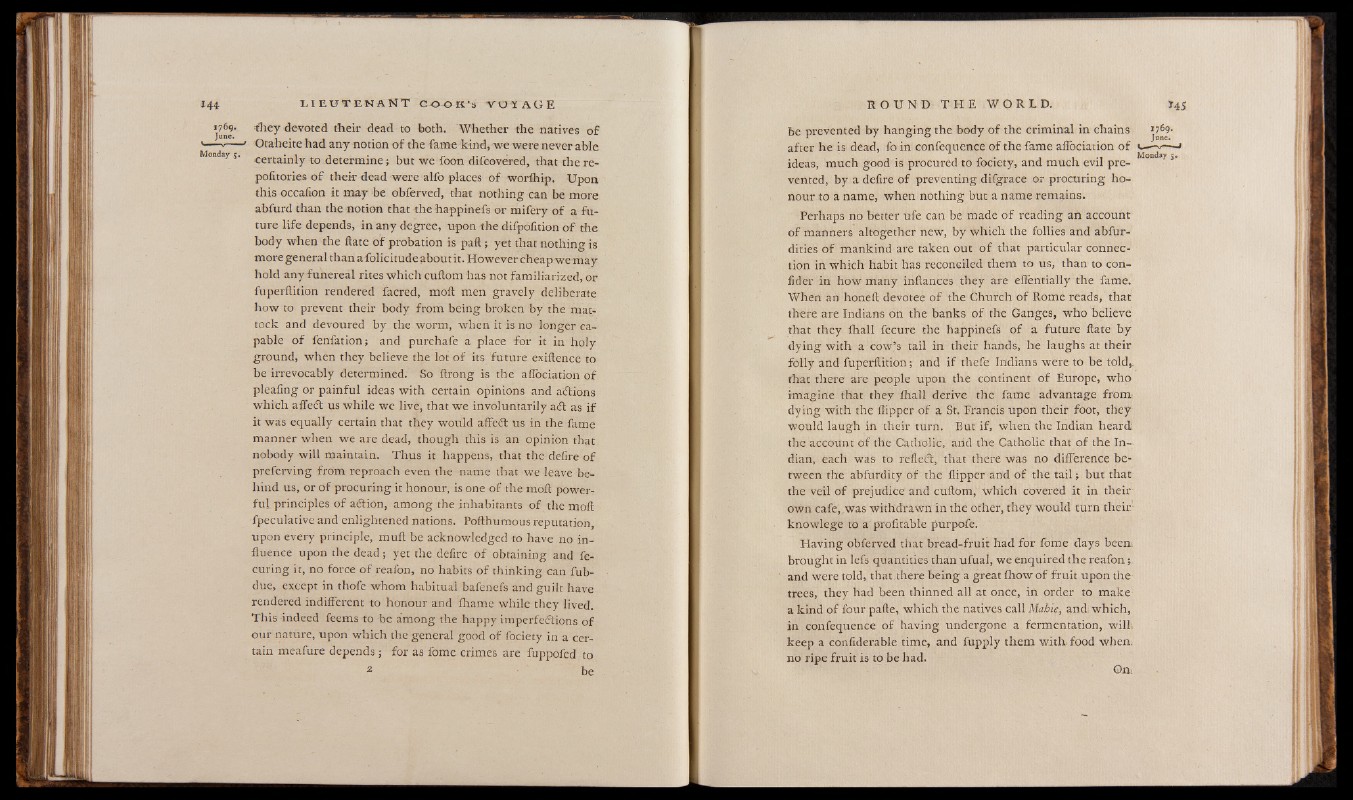
1769. they devoted their dead to both. Whether the natives of Jane. t .
1--------- ' Otaheite had any notion o f the fame kind, we were never able
Monday s. ;Certajniy t0 determine; but we Toon difeovered, that the re-
pofitories of thek dead were alfb places of worfhip. Upon
this occafion it may be obferved, that nothing can be more
abfurd than the notion that the happinefs or mifery of a future
life depends, in any degree, upon the difpofition o f the
body when the ftate of probation is paft; yet that nothing is
more general than a folicitude about it. However cheap we may
hold any funereal rites which cuftom has not familiarized, or
fuperftition rendered facred, moil men gravely deliberate
how to prevent their body from being broken by the mattock
and devoured by the worm, when it is no longer capable
of fenfation; and purchafe a place for it in holy
ground, when they believe the lot of its future exiflence to
be irrevocably determined. So ftrong is the aflociation of
plealing or painful ideas with certain opinions and actions
which aflfeft us while we live, that we involuntarily aft as if
it was equally certain that they would affect us in the fame
manner when we are dead, though this is an opinion that
nobody will maintain. Thus it happens, that the defire of
preferving from reproach even the name that we leave behind
us, or o f procuring it honour, is one of the molt powerful
principles of aftion, among the inhabitants of the molt
fpeculative and enlightened nations. Pofthumous reputation,
upon every principle, mull be acknowledged to have no influence
upon the dead; yet the defire of obtaining and fe-
curing it, no force of reafon, no habits of thinking can fub-
due, except in thofe whom habitual bafenefs and guilt have
rendered indifferent to honour and fhame while they lived.
This indeed feems to be among the happy imperfeftions of
our nature, upon which the general good of fociety in a certain
meafure depends ; for as fome crimes are fuppofed to
2 be
be prevented by hanging the body of the criminal in chains
after he is dead, fo in confequence of the fame aflociation of
ideas, much good is procured to fociety, and much evil prevented,
by a delire of preventing difgrace or procuring honour
to a name, when nothing but a name remains.
Perhaps no better ufe can be made of reading an account
of manners altogether new, by which the follies and abfur-
dities of mankind are taken out of that particular connection
in which habit has reconciled them to us, than to con-
fider in how many inftances they are eflentially the fame.
When an honeft devotee of the Church of Rome reads, that
there are Indians on the banks of the Ganges, who believe
that they fhall fecure the happinefs of a future ftate by
dying with a cow’s tail in their hands, he laughs at their
folly and fuperftition; and if thefe Indians were to be told,,
that there are people upon the continent of Europe, who
imagine that they fhall derive the fame advantage from;
dying with the flipper of a St. Francis upon their foot, they
would laugh in their turn. But if, when the Indian heard;
the account of the Catholic, arid the Catholic that of the Indian,
each was to refleft, that there was no difference between
the abfurdity of the flipper and of the tail; but that
the veil of prejudice and cuftom, which covered it in their
own cafe,.was withdrawn in the other, they would turn their,
knowlege to a profitable purpofe.
Having obferved that bread-fruit had for fome days been
brought in lefs quantities than ufual, we enquired the reafon;
and were told, that.there being a great fhow of fruit upon the
trees, they had been thinned all at once, in order to make
a kind of four pafte, which the natives call Mahie, and which,
in confequence of having undergone a fermentation, wills
keep a confiderable time, and fupply them with, food when
no ripe fruit is to be had.
1769.
June.
Monday 5,